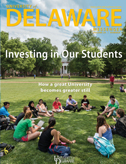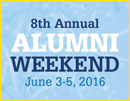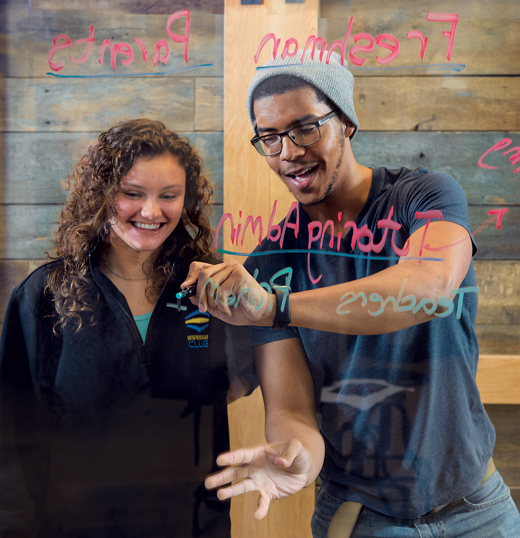
Incubating innovation
Igniting imaginations and empowering world changers
In today’s Shark Tank-obsessed society, “entrepreneurship” is a buzzword. At UD, it’s a mindset. A mantra. A tenet of higher education.
We live in a rapidly changing world where entrepreneurial ideas and new technologies have made the path to success increasingly non-linear—and where the security of lifelong jobs and vested pensions has disappeared. Today, it’s more essential than ever that we embrace grand challenges and support bold visions for tackling societal, environmental and business problems.
With this shift in educational philosophy, UD is building an array of programs and investing in resources across campus that aim to update traditional book-bound notions of “learning” with a progressive platform that inspires great minds and fosters great ideas. It is a movement that is sweeping across campus and touching students in every college, steadily integrating “Innovation & Entrepreneurship” (I&E) as a core component of the Blue Hen experience.
“Universities that don’t get this right will be left behind,” says Bruce Weber, dean of the Lerner College of Business and Economics.
UD’s Innovation & Entrepreneurship movement has great potential for broad impact—on UD’s reputation, on society at large and especially on the students it is educating today and in the future.
VENTURE DEVELOPMENT CENTER
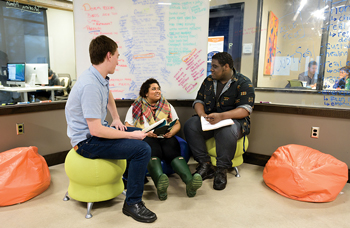
Part learning laboratory, part business incubator, the Venture Development Center (VDC) is the physical nexus of UD’s ambitions to give students with great ideas a place to make them real.
In its cozy, brainstorm-friendly spaces on Delaware Avenue, students work in teams and with expert mentors, capitalizing on the force-multiplier effect that many minds can bring to a fresh idea. Here, learning isn’t so much about classes and lectures, but about giving students experience in the real-world, nuts-and-bolts details of bringing ideas to market, from access to start-up funds to designing a marketing campaign.
On one day, a visitor might see three students from business, communication and engineering, working together on the multidisciplinary demands of a project, from funding to marketing to product development. Another day might bring a meeting with experienced private-sector entrepreneurs or expert alumni, eager to help nudge the students down the right path.
By taking that inside-out, outside-in approach, the VDC sets UD apart from many of its rivals, says Dan Freeman, director of the Horn Program in Entrepreneurship. And by giving innovative students a place to learn, collaborate and make crucial outside connections, it serves to unlock one of the secrets to entrepreneurial success, he says:
“Neither of us can do it alone. But together, we can do some pretty incredible things.”
In fact, UD’s entrepreneurship mission isn’t as much about generating patents, startups and profits as it is about showing students that they have the capacity to thrive amidst rapid change, the potential to take a path that’s never been walked and the ability to make the world one they want to live in.
“One student might launch a business or offer a service that meets a critical need. Another might create an advocacy group to effect social change. Still another might simply build a reputation in their future workplace as an innovator and a problem-solver,” says Acting President Nancy Targett. “We see this whole entrepreneurial ecosystem as one crucial way we can make UD stand out from our peers, and make our graduates stand out in the world.”
Ultimately, the aim is to create a university that not only imparts knowledge, but also instills a mindset—a willingness to dream, to dare, to adapt and overcome—in every UD student, regardless of major or career goal.
“I tell my students, ‘Go out and change the world!’” says Babatunde Ogunnaike, dean of the College of Engineering. “My view is that everyone can be entrepreneurial. My hope is that every student who comes out of the University of Delaware—not just engineers—has an entrepreneurial spirit.”
An Entrepreneurial Mindset
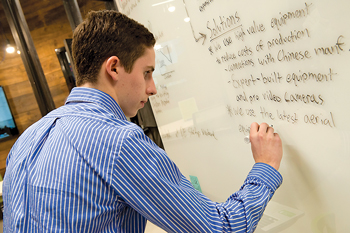
For Charlie Horn, a 1975 UD graduate whose $3 million gift to the University in 2011 established the Horn Program in Entrepreneurship, all of this is about creating learning environments for students hungry to change the world. It is about investing in their big dreams before life’s pressures come to bear. And it’s about giving those dreams a place to grow and become realized with the help of others—for the benefit of us all.
“All innovation, job creation, invention, improvements to the way we live—for example, the big challenges to cure disease, hunger, and to create sustainable sources of energy—it will all come from an entrepreneurial mindset,” Horn says. “And that mindset is, in its simplest sense, the belief in the ability to do the impossible—and the requisite skills to execute it.”
The energy provided by Horn’s gift—bolstered by the commitment of then-President Patrick Harker—quickly accelerated UD’s shift toward those dream-focused ideals. Today, that vision is being embraced at the highest levels: by Acting President Targett, Provost Domenico Grasso, deans of all seven colleges, and most crucially by incoming University President Dennis Assanis, who was selected in part because of his forward-leaning views on entrepreneurship’s role in higher education.
Already, in labs and collaboration centers across campus, young entrepreneurs are coming together to solve meaningful problems by developing world-changing ideas with the assistance of experienced innovators from the private sector.
It’s happening in places like the Horn Program’s Venture Development Center (VDC), a vibrantly decorated space with a laid-back, “no ties allowed” atmosphere, where students have the freedom and inspiration to dream big and take concepts to market. The VDC has become the epicenter of entrepreneurial education and experiences at UD. There, Nate Matherson, BE16, and Matt Lenhard, BE16, were able to grow the concept and resources needed to launch their business, LendEDU, a marketplace for students to review and compare student-loan refinancing options.
DELAWARE INNOVATION FELLOWS PROGRAM
To become a place where innovation and entrepreneurship thrive, UD knows it must continue to attract great students with exceptional aptitude—and give them the challenges and resources they need to grow.
That’s the goal of the Delaware Innovation Fellows Program, which launches this fall with its first cohort of 40 students from a variety of majors, selected (from more than 300 applicants) for their dedication, commitment and potential to be the world’s next great innovators. These are the students who have shown—through the activities they have tackled, and the things they have accomplished—that they have the passion, creativity and leaderships skills crucial for entrepreneurial thinking.
Starting as freshmen, the fellows will be immersed in the intricacies of identifying a concept, finding funding and connecting with outside mentors as they work toward project launch in their senior year. Along the way, they will take specialized courses, learn how to pitch their ideas to potential backers, expand their networking connections and even get internship experience inside a real-world startup.
In the coming years, UD aims to set itself even further apart—giving fellows the opportunity to participate in off-campus immersion experiences in places like the Silicon Valley, Europe and Africa.
And every year at the final round of Hen Hatch, UD’s premier startup funding competition, hundreds of students, alumni and community members gather to listen to the pitches of Blue Hens competing for a share of the competition’s $100,000 prize pool. In 2015, Carvertise, a student-created company, found success with its concept of paying consumers to have their cars wrapped as “rolling billboards.” The company now employs a team of six who work from their Wilmington, Delaware office.
The I&E movement is not limited to the commercial, as evidenced by Lindsay Yeager, AS15, who as a junior learned the limitations of women’s health care in Third World countries during a study abroad trip to Tanzania. With the help of UD resources, Yeager developed a program that gives poor women access to reusable sanitary pads and provides them with a means to earn an income by making and selling them. Yeager’s solution solved an access problem that had discouraged many women from pursuing educational opportunities—and opened doors to improved social and economic well-being.
UD is aggressively working to inspire more students like Lindsay, Nate and Matt—to ignite their imaginations and support their dreams as they explore, define and refine their visions into practical realities that serve the world.
And UD’s campuswide efforts are making a big impact. Already there are dozens of ideas simmering across campus, ready to burst into the world. Maybe the next big thing will be the student-developed mobile app called PocketFarmer that helps Christmas tree farmers identify and mark diseased plants. Or possibly it will be SimUCath, a wearable training system for urinary catheterization that was developed by a team of four students and has since gone on to win Grand Prize at the 14th annual Design of Medical Devices Conference.
The examples of student-led creativity and problem solving go on: Lazarus Rising, a resume writing service to help homeless men and women obtain employment and move off the streets; GeoSpot, a location-based file sharing application with commercial and educational uses; and Vibrating Therapeutic Apparel, which aims to alleviate pain and improve health outcomes. At UD’s Spin In program—which seeks to connect innovative undergraduates with entrepreneurial businesses—last year’s efforts resulted in a device for removing a pervasive toxin from drinking water, a smartphone app that allows bosses to coach sales reps while they’re on the road, and a biofeedback device called “mTrigger” that is expected to hit the market soon.
“In the beginning, it was challenging to collaborate with such different people,” says mTrigger developer Adam Engelson, EG16. “On the mTrigger project, we learned to work together with graphic designers, biomedical engineers and business analysts while getting exposed to the whole product life cycle.”
It’s those kinds of experience-based, mentor-assisted approaches that will be crucial in UD’s efforts.
“Hands-on, experiential learning isn’t just an academic buzzword,” says Acting President Targett. “It’s something we must cultivate, nurture and grow. This is what we mean when we talk about entrepreneurship at UD.”
Challenges and Opportunities
While UD is well positioned to incorporate holistic, entrepreneurial educational experiences, that task is not without its obstacles.
Creating a system where each cog in the University machine is aligned for accommodating, nurturing and possibly commercializing big dreams is admittedly daunting—somewhat like changing the tires while the car is still in motion.
Y COMBINATOR
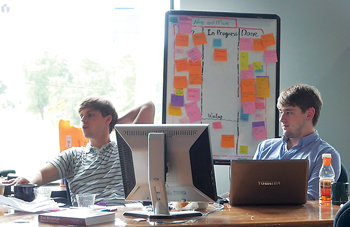
A couple of years ago, all Nate Matherson, BE16, and Matt Lenhard, BE16, had was a good business idea and a lot of determination. A year later, they were being whisked to Mountain View, California, to meet with investors. By this time next year, these UD students could be rich men—before either of them reaches their 23rd birthday.
It all started with an idea for a website called LendEDU, which acts as a marketplace for students to review and compare student loan refinancing options. With help from UD’s Venture Development Center and the Horn Program, the friends grew their concept into a business that already works with top national lenders. The LendEDU team is now up to six strong, with fellow Blue Hens Alex Coleman, BE15, Dave Rathmanner, EG16, Tommy Flynn, BE17, and Mike Fiorito, HS18, on staff.
Now, they’re ready for the next big step.
Last December, the founders were accepted as one of 107 startups (from 6,000-plus global applicants) for the world’s most successful startup incubator, Y Combinator, nationally known as a place where entrepreneurs receive “boot camp” training and possibly venture capital funding. It was the chance they both knew could be the big one—the chance to become that next Y Combinator success story, following in the footsteps of such startups as Reddit, Dropbox and Airbnb.
Getting into the program was, in Matherson’s words, “one of the happiest moments of my life.”
Perhaps the biggest challenge is that entrepreneurship isn’t so much a “field of knowledge,” like chemistry or physics, as it is an activity—a progression of steps that demands an ability to utilize a variety of tools and collaboration with a variety of players.
“It’s something you do, not something you know,” says Horn.
The University possesses some clear advantages in the quest for this new paradigm of education—assets like the 272-acre Science, Technology and Advanced Research (STAR) Campus and the state-of-the-art Harker Interdisciplinary Science and Engineering Laboratory. Meanwhile, the Delaware Technology Park, a joint venture between the University and the state of Delaware, is a key driver of science-based and technology-driven innovation.
“I really do believe the Horn Program and [UD’s] entrepreneurship effort are so core to what we’re trying to do as a state,” Gov. Jack Markell said at the Horn Program’s inaugural Innovation and Entrepreneurship Showcase in 2015. “Delaware’s economy is going to be vibrant for years to come.”
As Dan Freeman, director of the globally recognized Horn Program in Entrepreneurship, says, “Innovators and world changers fall in love with solving problems, not learning solutions.”
When you place innovative students and world-class faculty in collaborative environments, life-changing ideas emerge. Consider the creations of chemical engineering professor Terry Papoutsakis, who founded the tech firm Elcriton to commercialize his technology for using microbes as engines of renewable energy. Or the seems-like-science-fiction research of chemical engineering professor Norman Wagner, who is pursuing commercialization of his technology for fashioning life-saving body armor out of fluid materials. Or the now-ubiquitous touch-screen technology familiar to every cell phone and mobile device user, co-developed by alumnus Wayne Westerman, EG99PhD, while studying here at UD. Emerging ideas pertaining to flow batteries for large-scale energy storage, microbes for improving crop yields and naked eye 3-D hint at UD’s growing pipeline of innovations.
Looking ahead
FIRST STEP GRAND CHALLENGES
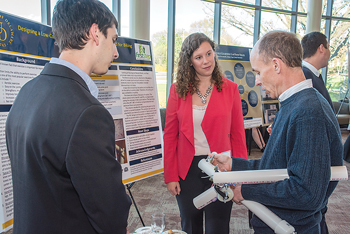
When it comes to innovation, a little competition and some prize money can be great motivators.
That’s what UD has found with such efforts as Hen Hatch—the Horn Program’s annual funding competition for students, faculty and staff with big ideas.
Now, the University is working to inspire that innovative spirit in a way that tackles social and environmental problems in addition to commercial startups. The First Step Grand Challenges program asks interdisciplinary teams of undergraduates across campus to spend a year identifying and working to resolve a big social problem they care about—world hunger, for example, or sustainable energy.
“We are looking for true interdisciplinary ideas from all across campus,” says Kathy Matt, dean of the College of Health Sciences, which launched the First Step program in the 2014 school year.
The teams whose ideas have the greatest potential for impact get a share of $25,000 in prize, seed and grant money—helping students overcome the financial barriers that can stand between ideas and action. Along the way, the competition gives them faculty guidance, mentoring opportunities and other startup-related advice.
Building upon its existing Innovation & Entrepreneurship-related degree programs, UD is further developing a broad array of educational programming. Adding to the foundation of a bachelor’s degree major, an undergraduate minor, a master’s degree and a graduate certificate, UD will welcome the incoming class of Delaware Innovation Fellows this fall, as well as introduce a new MBA major in entrepreneurship and design, and an undergraduate minor in social entrepreneurship.
UD has also become a global leader in youth entrepreneurship education. The Horn Program’s Diamond Challenge for High School Entrepreneurs is a four-year-old program that has brought introductory, evidence-based entrepreneurship education as well as business concept and social venture competitions to thousands of students across the world. As the cornerstone of the Paul and Linda McConnell Youth Entrepreneurship Initiative, the 2016 Diamond Challenge has involved schools and students from 17 states and 22 countries on five continents. The global finals of the $50,000 Diamond Challenge and a celebration of youth entrepreneurship—the Youth Entrepreneurship Summit (or YES!) —will be hosted on UD’s campus, planned for April 2016.
“Not only are new solutions to important societal problems being imagined by these young students, they are being prepared to create meaningful lives for themselves,” says Julie Frieswyk, director of the Diamond Challenge.
UD also envisions even more industry partnerships in its future, thanks to a network of successful alumni who are eager to help. This access to the experts is crucial for mentoring students, connecting with industry and establishing pathways to funding. And already the University has seen significant new investment from corporate and foundation sources, says Rob Rudd, senior director of corporate and foundation relations for the University.
It is part of a larger trend, notes Freeman.
“We’re seeing it not just here but across the country,” he says, “The private sector is looking to universities to partner in ways they’ve never partnered before.”
An Invitation to Engage
Active engagement by alumni and community leaders is critical to the success of UD’s I&E movement. Alumni and friends are invited to get involved with the University by sharing their experiences and expertise; providing resources and connections for students; and presenting interesting problems seeking innovative solutions. For more information on how to get involved, contact the Horn Program in Entrepreneurship at hornprogram@udel.edu.
